
Japan Review
Scope & Guideline
Exploring the Depths of Japanese Culture and Society
Introduction
Aims and Scopes
- Cultural Studies and Representation:
The journal focuses on the representation of Japanese culture in various mediums, including literature, film, and theater, examining how these forms reflect and shape national identity. - Historical Analysis:
Japan Review publishes in-depth historical studies that explore significant events, movements, and figures in Japan's past, providing critical insights into their implications for contemporary society. - Religious and Spiritual Studies:
The journal emphasizes the role of religion and spirituality in Japan, looking at traditional practices, contemporary expressions, and their intersections with modernity and politics. - Political and Social Dynamics:
Research in this journal often investigates Japan's political landscape, including governance, national identity, and social movements, particularly in relation to historical contexts and global interactions. - Transnational Perspectives:
The journal encourages studies that explore Japan's connections with other cultures and nations, highlighting themes of colonialism, diaspora, and cultural exchange. - Environmental and Technological Issues:
Japan Review also addresses contemporary challenges such as environmental concerns and technological advancements, analyzing their cultural and social ramifications.
Trending and Emerging
- Cultural Memory and Trauma:
Recent publications increasingly address themes of cultural memory, particularly in the context of historical traumas such as World War II and the Fukushima disaster, highlighting their enduring impact on Japanese identity. - Youth and Activism:
There is a growing focus on Japanese youth movements and their role in shaping contemporary society, reflecting a broader interest in generational change and civic engagement. - Environmental and Technological Intersections:
Emerging themes include the intersection of technology and environmental issues, particularly in relation to Japan's response to natural disasters and climate change, showcasing a commitment to addressing pressing global challenges. - Transnational Cultural Exchange:
The journal is increasingly publishing works that explore Japan's cultural exchanges with other nations, emphasizing globalization and the complexities of cultural identity in a transnational context. - Reimagining Historical Narratives:
There is a trend towards reinterpreting historical narratives, particularly those involving marginalized voices and alternative perspectives, which reflects a broader movement towards inclusivity in scholarship.
Declining or Waning
- Traditional Literary Criticism:
There has been a noticeable decline in papers strictly focused on traditional literary criticism, suggesting a shift towards more interdisciplinary approaches that incorporate cultural and historical contexts. - Colonial Literature Studies:
The exploration of colonial literature, while still present, is less frequent, indicating a potential waning interest in narratives strictly defined by colonial experience as scholars seek broader transnational frameworks. - Historical Imperialism:
Research centered on imperialism in a purely historical context seems to be declining, with more emphasis now placed on contemporary implications and post-imperial narratives. - Static Religious Studies:
Studies that focus solely on established religious practices without engaging their contemporary relevance or transformation are appearing less frequently, signaling a move towards dynamic explorations of religion.
Similar Journals
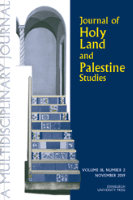
Journal of Holy Land and Palestine Studies
Navigating the Intersections of Culture and Religion in the Holy LandThe Journal of Holy Land and Palestine Studies, published by Edinburgh University Press, is a distinguished academic journal dedicated to the interdisciplinary exploration of historical, cultural, and religious issues pertaining to the Holy Land and Palestine. With an ISSN of 2054-1988 and an E-ISSN of 2054-1996, the journal aims to foster a deeper understanding of the complexities surrounding the region from both contemporary and historical perspectives. Since its inception in 2002, the journal has consistently contributed to its field, achieving notable rankings with a Q2 designation in Literature and Literary Theory, and Q3 in Cultural Studies, History, and Religious Studies for 2023. The Journal of Holy Land and Palestine Studies serves as a critical platform for researchers, professionals, and students to disseminate and engage with scholarly work that advances knowledge and fosters dialogue on the pressing issues related to this unique region. Although the journal is not open access, its rich content and esteemed reputation ensure that it remains an essential resource for scholars in the humanities and social sciences.
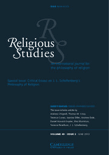
RELIGIOUS STUDIES
Illuminating the Intersection of Philosophy and FaithRELIGIOUS STUDIES, published by Cambridge University Press, is a prestigious journal dedicated to the exploration of diverse religious traditions and philosophical inquiries. With an ISSN of 0034-4125 and an E-ISSN of 1469-901X, this journal has established itself as a pivotal platform for scholarly dialogue since its inception in 1965, continuing its impactful contributions until 2024. The journal is ranked in the top quartile (Q1) in both Philosophy and Religious Studies, illustrating its significant standing within the academic community; it holds an impressive Scopus rank of #64 in Religious Studies and #180 in Philosophy, placing it in the 90th and 77th percentiles respectively. Though not open access, RELIGIOUS STUDIES offers critical insights and original research that address contemporary issues in spirituality, ethics, and interreligious dialogue, making it an essential resource for researchers, professionals, and students alike seeking to deepen their understanding of the complex interplay between religion and society.
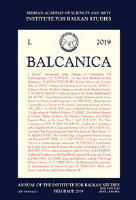
Balcanica
Unlocking Insights into the Heart of the Balkan RegionBalcanica is a distinguished academic journal published by the Serbian Academy of Sciences and Arts, Institute of Balkan Studies, focusing on the multidisciplinary study of the Balkan region. With its roots tracing back to 1999 as an Open Access publication, Balcanica provides a platform for researchers and scholars to disseminate impactful findings pertaining to history, culture, politics, and economics of the Balkans. The journal aims to foster dialogue and understanding of the complexities within the Balkan context, not only serving as a vital resource for seasoned academics but also for students and professionals seeking comprehensive insights. By promoting scholarly exchange, Balcanica remains an influential repository of knowledge and a cornerstone for those dedicated to the advancement of Balkan studies, with a commitment to accessibility for a broader audience.
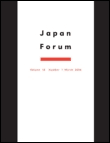
Japan Forum
Unveiling the Intricacies of Japan's Past and PresentWelcome to Japan Forum, a prestigious journal published by Routledge Journals, Taylor & Francis Ltd, dedicated to the multifaceted exploration of contemporary Japan and its rich cultural heritage. With an ISSN of 0955-5803 and an E-ISSN of 1469-932X, this journal holds a prominent position in the academic community, boasting a 2023 impact factor in the Q1 category for both Cultural Studies and History, demonstrating its significance in fostering scholarly discussions in these areas. Furthermore, it occupies the Q2 category in Sociology and Political Science, highlighting its interdisciplinary reach. Japan Forum has consistently provided a platform for researchers, professionals, and students since its inception in 1989, with publication timelines spanning notable years until 2024. Though it currently does not offer Open Access, the journal's rigorous peer-review process and wide-ranging scope ensure that it remains a vital resource for those seeking to deepen their understanding of Japanese society, politics, and culture. Its impressive rankings in Scopus further underscore the journal's commitment to academic excellence, making it an essential reference for anyone engaged in the study of Japan.
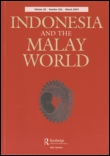
Indonesia and the Malay World
Engaging Scholars in the Heart of Southeast Asian StudiesIndonesia and the Malay World, an esteemed journal published by Routledge Journals, Taylor & Francis Ltd, stands at the forefront of interdisciplinary research within the fields of Anthropology, Arts and Humanities, and Geography. With a publication history spanning from 2000 to 2024, this journal has carved a niche for itself, maintaining a Q2 category ranking in its respective disciplines as of 2023, underscoring its significant impact in the academic community. Researchers and scholars are encouraged to delve into a diverse array of topics pertinent to the Indonesian and Malay regions, contributing to a deeper understanding of cultural, social, and environmental dynamics. The journal does not currently offer open access but remains committed to disseminating high-quality research that engages professionals and students alike. With impressive rankings in Scopus—ranked 120th in Anthropology and 167th in Arts and Humanities—this journal is an invaluable resource for anyone looking to explore and contribute to the rich tapestry of Indonesian and Malay studies.
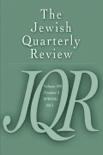
JEWISH QUARTERLY REVIEW
Exploring the Depths of Jewish Culture and HistoryJewish Quarterly Review, published by University of Pennsylvania Press, is a distinguished academic journal that delves into the multifaceted realms of Jewish culture, history, and religious studies. With a rich publication history dating back to 1953 and an impressive track record of rigorous scholarship, this journal maintains a Q2 ranking in key categories such as Cultural Studies, History, and Religious Studies in 2023, placing it among the top-tier journals in its field. The ISSN number 0021-6682 and the E-ISSN 1553-0604 ensure that its scholarship is widely accessible and traceable in academic databases. While the journal is not open access, it remains an essential resource for researchers, professionals, and students seeking in-depth analysis and perspectives on Jewish thought and heritage. The JQR is known for its editorial commitment to enhancing understanding and dialogue across cultural and historical contexts, making it an invaluable asset for anyone engaged in Jewish studies and related disciplines. With its headquarters in Philadelphia, PA, the journal continues to foster scholarly engagement and critical discourse on Jewish identity and experience through its carefully curated articles and reviews.
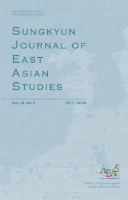
Sungkyun Journal of East Asian Studies
Exploring the Rich Tapestry of East Asian CulturesSungkyun Journal of East Asian Studies, published by the ACAD EAST ASIAN STUD, SUNGKYUNKWAN UNIVERSITY, is a premier open-access journal dedicated to the exploration and analysis of East Asian cultures, histories, and societies. Since its establishment in 2010, this journal has rapidly gained recognition, currently holding a notable impact across various disciplines, including Anthropology, Cultural Studies, Literature, Religious Studies, Sociology, and Political Science. As of 2023, it is classified in quartiles Q4 in Anthropology and Sociology, and Q3 in Cultural Studies and Religious Studies, highlighting its growing influence and relevance in contemporary research. Researchers and scholars can take full advantage of its open-access model introduced in 2021, ensuring broad dissemination of knowledge and fostering an inclusive academic discourse. The journal aims to facilitate interdisciplinary dialogue and critical insights into East Asian issues, making it an invaluable resource for students, professionals, and academics seeking to deepen their understanding of this dynamic region.

Miranda
Advancing knowledge through open dialogue.Miranda (ISSN: 2108-6559, E-ISSN: 2108-6559) is a distinguished open access journal published by UNIV TOULOUSE II-JEAN JAURES, dedicated to advancing knowledge across various fields of the humanities and social sciences. Since its establishment in 2010 as an open access platform, Miranda has aimed to foster inclusive academic discourse by providing unrestricted access to high-quality research. With its commitment to accessibility and scholarly excellence, this journal serves as an essential resource for researchers, professionals, and students seeking to enrich their understanding and engage with contemporary issues within their disciplines. The journal prides itself on its rigorous peer-review process and aims to publish original research, reviews, and interdisciplinary studies that contribute to the evolving landscape of humanities and social science research. Located in Toulouse, France, Miranda is poised to make a significant impact in its field and invites contributions that reflect diverse perspectives and innovative research methodologies.

Studi irlandesi-A Journal of Irish Studies
Bridging Cultures Through Irish ScholarshipStudi Irlandesi - A Journal of Irish Studies, published by FIRENZE UNIV PRESS, stands as a pivotal platform for the dissemination of scholarly research in the field of Irish Studies. With its Open Access model established since 2011, the journal facilitates the global exchange of knowledge and ideas, catering to researchers, professionals, and students with an interest in Ireland's rich cultural, historical, and literary heritage. The ISSN for the journal is 2239-3978, ensuring easy accessibility for those engaged in contemporary Irish studies. This journal not only aims to advance academic discourse but also serves as a crucial resource for interdisciplinary analysis surrounding Irish identity and its global impacts. As an essential publication within its field, Studi Irlandesi invites contributions that enhance understanding of Ireland’s complexities and its contributions to world culture.
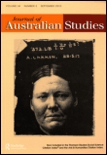
Journal of Australian Studies
Unveiling the Depths of Australian Identity and DiscourseThe Journal of Australian Studies, published by Routledge Journals, Taylor & Francis Ltd, is a premier academic journal dedicated to exploring the richness and diversity of Australian culture, history, literature, and politics. With an ISSN of 1444-3058 and an E-ISSN of 1835-6419, this esteemed journal has been contributing to the scholarly conversation since its inception in 1977 and continues to publish impactful research through 2024. Rank-wise, it excels in multiple categories, holding a Q2 position in both Cultural Studies and History, a distinguished Q1 in Literature and Literary Theory, and notable Q3 rankings in Political Science, International Relations, and Sociology. The journal is recognized for its strong performance in Scopus rankings, particularly in Literature and Literary Theory, where it holds a 92nd percentile rank. This makes it a vital resource for researchers, professionals, and students invested in Australian studies, providing open discourse on the nation’s cultural and historical narratives without the barrier of open access restrictions. Engaging with this journal enables a deeper understanding of Australia’s multifaceted identity within the global context, inviting contributions that challenge and expand the field.